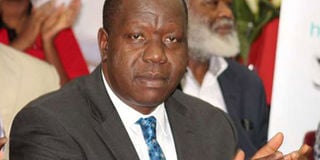Why education reforms should not be tied to election

Fred Matiang'i, the Cabinet Secretary for Education, Science and Technology, at Sarit Centre in Nairobi on September 22, 2016. PHOTO | DENNIS ONSONGO | NATION MEDIA GROUP
What you need to know:
The 8-4-4 system of education was well-intentioned, but failed because it was implemented in a hurry.
The Cabinet Secretary for Education, Science and Technology, Fred Matiang’i, should resist the temptation to rush the reform.
He must listen to all the stakeholders, especially teachers, who are the real implementers.
The ongoing reforms in the education sector are a clear demonstration that the country is geared towards realising the sustainable development goals (SDGs).
The vision and spirit is to transform lives through education; recognising its important role as a main driver of development. To this end, Kenyans should commit themselves with a sense of urgency to a single, renewed education agenda that is holistic, aspirational, and all-inclusive. Indeed, this new vision is fully captured in the SDGs: “Ensure inclusive and equitable quality education and promote lifelong opportunities for all.”
The drive by the stakeholders since the reform began a year ago is the most important commitment to changing the education system in the recent decades. However, the passion and speed with which the changes are being made, more particularly the zeal with which the Education Cabinet Secretary Fred Matiang’i is conducting this, raises a lot of questions about the government’s commitment and strategy. The reforms, which have now dominated the public discourse should be allowed to flow at a natural speed, driven by stakeholders through public participation. The timelines for the curriculum reforms, and particularly, sequencing of activities, should be discussed and agreed with the stakeholders. Dr Matiang’i and a few State operatives hell-bent to tie education reform to the August 8 elections, cannot make decisions on their own.
HUMAN DEVELOPMENT
Kenyans are yearning for a holistic education that identifies and nurtures young people’s talents and interests. Indeed, education is at the centre of human and economic development. We need to produce citizens who are competent intellectually, emotionally and physically.
This is the reason we are calling on Dr Matiang’i and others not to link the reforms to elections, as is the case with the standard gauge railway project, the primary school laptops, the Last Mile Connectivity, and the pay rise for public servants. The rush to reform the curriculum has caused unprecedented anxiety, hence the need to divorce it from the 2017 General Election agenda. Dr Matiang’i should insulate it from political interference. Kenyans would be delighted to see him redeem his image after the 2016 Kenya Certificate of Secondary Education (KCSE) examination fiasco, where candidates were massively failed, with only a paltry 15 per cent qualifying for university admission. The CS should concern himself more with preparing (retraining) teachers ahead of implementation of the new curriculum, and how it will be funded at a time when the economy is doing badly. He should also focus on infrastructure in schools, hiring more teachers, and more importantly, reviving the school feeding programme. The ministry should develop a sound communication strategy and allow time for public debate and consensus-building. It should ensure the national task force on curriculum review and the technical team drive the process professionally.
ENSURE QUALITY
This should be given ample time to ensure quality. The process should be allowed to take its natural course without undue political pressure. The ministry must train teachers. Unless the teachers understand this paradigm shift, and adjust their attitude on “what do we educate for”, it will be a big challenge. For now, the critical task is piloting, which should start in January, 2018. The syllabuses should be developed and the teaching and learning materials done. The Kenya Institute of Curriculum Development, which is midwifing it, must then evaluate and share its findings with the public before full implementation.
The 8-4-4 system was well-intentioned, but failed because it was implemented in a hurry. Dr Matiang’i should resist the temptation to rush the reform; he must listen to all the stakeholders, especially teachers, who are the real implementers.
Wilson Sossion is secretary-general, Kenya National Union of Teachers.





